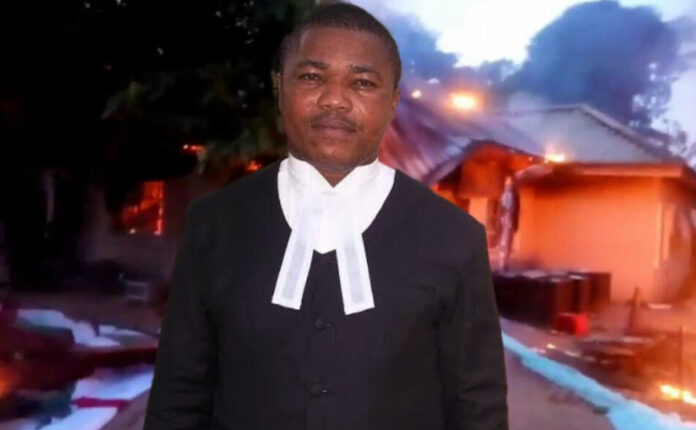By Chuks Eke
A commentator on national issues, Sir Ifeanyi Ejiofor has described Tuesday’s altercation between the Minister of Federal Capital Territory, FCT, Nyesom Wike and a military officer as a practical show of shame and a vulgarity of power not majesty of authority.
In a press statement issued on Wednesday, titled: “when the custodians of decorum turn clowns, society loses it’s moral mirror. Wike’s show of shame, a national disgrace”, Ejiofor expressed disappointment that a man entrusted with the administration of the nation’s capital descended into arrogance, condescension, and aggression.
According to him, It was painful to watch, a public official, intoxicated by power, hurling insults at a uniformed officer who, by contrast, embodied restraint, decorum, and discipline.
“To the credit of that gallant officer, he maintained composure throughout, choosing professionalism over provocation, dignity over derangement. In that moment, he became a silent teacher of moral instruction, exposing the thinness of Wike’s pretensions to leadership. His calmness shamed the chaos before him; his discipline illuminated the Minister’s darkness”.
“There comes a time in the life of a nation when its people must pause to examine not just institutional failures, but the moral emptiness of those who lead them”.
What happened yesterday in the Federal Capital Territory, the disgraceful public altercation between the Minister of the FCT, Nyesom Wike, and a 24-year-old military personnel, was not merely unfortunate. It was a painful reflection of the depth of moral decay and leadership bankruptcy afflicting our political system”.
“Yet, what is most tragic is not the behaviour of one man but what it represents. Wike is not an anomaly; he is a symptom of a nation that has separated power from principle and leadership from character”.
“Nigeria has become a society where position is mistaken for capacity and authority confused with wisdom. Insolence in leadership and vulgarity in public discourse have become normalized. In a saner clime, a minister who behaves like a street urchin would not only resign but be ostracized from public life. His membership of a revered body such as the Body of Benchers, the guardian of the legal profession’s integrity, would have been immediately suspended”.
“That Wike still retains such honours despite repeated misconduct indicts our collective conscience. It questions the seriousness of our institutions and the sincerity of those entrusted with preserving their sanctity”.
“The Body of Benchers does not only reward learning but demands character as a sacred standard. It is this moral filter that distinguishes the noble profession of law from others. When a member publicly exhibits arrogance, vulgarity, and abuse of power, the very vices the institution exists to check, then we must ask: What does the Body of Benchers now stand for? Has membership become a title for the politically connected, or does it still symbolize moral and intellectual discipline?”
“Leadership is not noise or muscle; it is the disciplined exercise of power with humility. True leadership respects the dignity of others, inspires confidence, not fear; respect, not resentment”.
“What we witnessed in Wike was not leadership; it was theatre, a show of shame, an exhibition of insecurity disguised as bravado. When a leader must shout to assert control or humiliate others to feel relevant, he exposes his inner emptiness and loss of moral authority”.
“We cannot ignore the implications for the younger generation. In a society where officials speak the language of the gutter and behave like thugs in designer suits, what moral lessons are we offering our youth? How do we tell them that character matters when those at the top lack home training?”
“We lament that our youths are drawn to internet fraud and drug abuse. But what moral reference do they have when adults in power model corruption, vulgarity, and impunity?”
“The time has come for President Bola Ahmed Tinubu, as Wike’s appointing authority, to draw a moral line. Silence in the face of such misconduct is complicity. If the President truly believes in restoring dignity to governance, this is the moment to act, to remind his appointees that office is a privilege that demands civility and restraint”.
“Similarly, the Body of Benchers must defend the integrity of its name. It must not allow political favouritism to erode its moral standard. The nation watches to see if it will have the courage to hold one of its own accountable for conduct unbecoming of a learned gentleman”.
“This is a moment for introspection, not only about Wike’s behaviour but about the culture of impunity that allows such men to thrive. We must re-establish character as the true measure of leadership, not noise, wealth, or influence”.
“If we continue to reward insolence and overlook misconduct, we will raise a generation of rulers without restraint, men who mistake brutality for strength, arrogance for confidence, and vulgarity for candour. Wike’s shameful outburst may yet serve a purpose, if it awakens us to the urgent need for moral renewal in public life”.
“By his conduct, he has dishonoured the office he holds, embarrassed his profession, and ridiculed the nation before the watching world. He was uncouth, unprofessional, and utterly disgraceful, a stark reminder that character, not power, remains the only legitimate foundation for authority”.
“Remember: the world is watching!
President Trump is watching.
Nigerians are taking records.
Posterity is hastening judgment.
If character were the yardstick, half of Nigeria’s rulers would be unemployable”.







